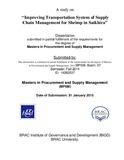| dc.contributor.advisor | Rahman, Dr. Md. Mizanur | |
| dc.contributor.author | Hasan, Md. Abul | |
| dc.date.accessioned | 2016-01-14T12:07:24Z | |
| dc.date.available | 2016-01-14T12:07:24Z | |
| dc.date.copyright | 2015 | |
| dc.date.issued | 2015-01-31 | |
| dc.identifier.other | ID 14282037 | |
| dc.identifier.uri | http://hdl.handle.net/10361/4803 | |
| dc.description | This dissertation is submitted in partial fulfillment of the requirements for the degree of Masters in Procurement and Supply Management, 2015. | en_US |
| dc.description | Cataloged from PDF version of thesis report. | |
| dc.description | Includes bibliographical references (page 41-43). | |
| dc.description.abstract | The study titled “Improving Transportation System of Supply Chain Management for Shrimp in Satkhira” was carried out from November to December 2014 on the basis of both primary and secondary information. Shrimp farming has emerged one of the most important economic activities in Bangladesh and become, by and large, the third largest export industry in Bangladesh. Shrimp culture in coastal areas plays a vital role providing employment, income, food security, and poverty alleviation to remote coastal people. The urban population is also benefited from processing, value adding, and marketing of the shrimp as a whole. The increasing demand and steadily rising prices of shrimp encourage its cultivation in the coastal belt of the country especially in Satkhira. In export markets, the demand for shrimps is huge although it is faced with quite a large number of challenges which are related to ensuring compliance with hygiene standards, non-tariff barriers, and some stiffer terms and conditions.
Transportation is one of the most dominating factors in shrimp farming and exporting. Any lapse of transportation activities can significantly damage the whole process of shrimp industry. In this study, a number of transportation problems have been identified and analyzed in the shrimp industry in Satkhira. The disintegrated supply chain management of shrimp is a great problem in this area. Poor infrastructure facilities such as lack of modern transport, ice factory, electricity, proper transportation system of prawns and shrimps from remote areas to depots, lack of technical knowledge in marketing and shrimp cultivation, grading and processing are the great problems in shrimp industry.
In this study, the primary data have been collected mostly from the five different groups which are local shrimp farmers, local shrimp post larva (PL) suppliers, Beparies, Aratdars and Depot owners. These five groups are mainly involved in shrimp cultivation and business. The main focus of this study is to examine the existing supply chain transportation system used in the shrimp of Satkhira district. The objective of this study is to find out the problems directly related to shrimp cultivation and shrimp marketing. Finally, this study has drawn some recommendations which are expected to help improve the shrimp transportation system in Satkhira district. | en_US |
| dc.description.statementofresponsibility | Md. Abul Hasan | |
| dc.format.extent | 59 pges | |
| dc.language.iso | en | en_US |
| dc.publisher | BRAC University | en_US |
| dc.rights | BRAC University dissertation are protected by copyright. They may be viewed from this source for any purpose, but reproduction or distribution in any format is prohibited without written permission. | |
| dc.subject | Procurement and supply management | en_US |
| dc.subject | Supply chain management | en_US |
| dc.subject | Shrimp | en_US |
| dc.subject | Satkhira | en_US |
| dc.subject | Transportation system | en_US |
| dc.subject | BIGD | |
| dc.title | Improving transportation system of supply chain management for shrimp in Satkhira | en_US |
| dc.type | Thesis | en_US |
| dc.contributor.department | BRAC Institute of Governance and Development | |
| dc.description.degree | M. Procurement and Supply Management | |

